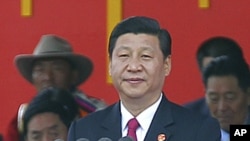Chinese Vice President Xi Jinping pledged Tuesday to speed up the economic development of Tibet, saying that is the key to resolving all issues in the distinctive Himalayan territory.
Xi was speaking at a ceremony in the capital, Lhasa, to mark the 60th anniversary of Chinese rule in Tibet. China refers to the 1951 takeover as the "peaceful liberation" of Tibet, although some Tibetans see it as a military occupation.
Paramilitary policemen march in formation in front of the Potala Palace during a parade celebrating the 60th anniversary of Tibet's peaceful liberation in Lhasa, Tibet Autonomous Region July 19, 2011. (Reuters)
Speaking in front of the historic Potala Palace, Xi spoke bluntly about the influx of ethnic Han Chinese into the territory, a development causes some Tibetans fear their unique culture is being overwhelmed. Xi said China should promote the idea that the Han and ethnic minorities are interdependent and "cannot live without each other."
Xi also said China should "fight against" separatist activities by followers of the Dalai Lama, the Tibetan spiritual leader who lives in exile in India. Xi's remarks were reported by the official Xinhua news agency and published in major Chinese newspapers.
China considers the Dalai Lama a dangerous separatist, though the Buddhist priest insists he seeks only increased autonomy for his homeland. Xi said all ethnic groups in Tibet should take measures to address the root cause of separatism so as to "completely destroy" any attempt to undermine stability.
Almost 200 people died during ethnic rioting in Tibet in 2008, prompted largely by Tibetan resentment against Han Chinese. China responded with harsh security measures.
Xi described Tibet as a "national security screen" for China, hinting at one reason for Beijing's concern over any sign of instability. The Tibetan plateau serves as a barrier between central China and its greatest potential rival in Asia, India.
Xi also said the plateau, the source of China's great rivers, is an important ecological screen for China and a major source of strategic resources.




